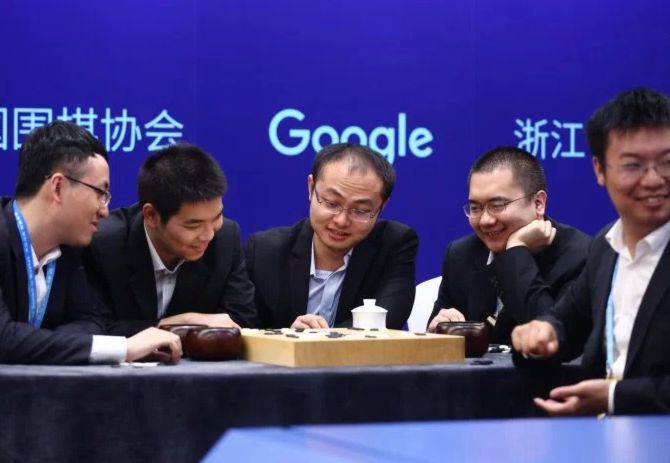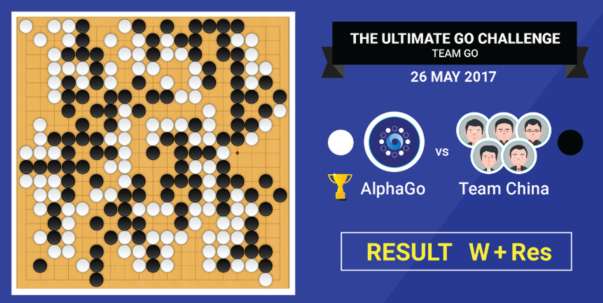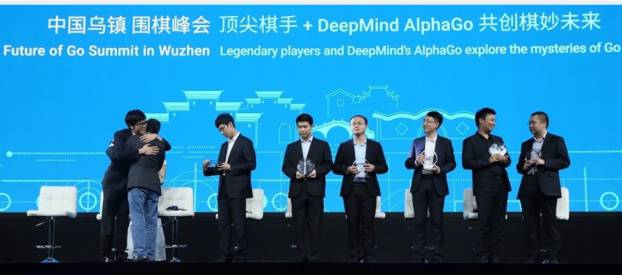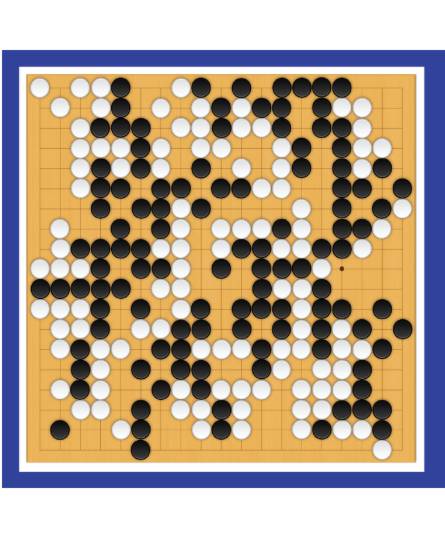| AlphaGo Triumphs In China |
| Written by Sue Gee |
| Saturday, 27 May 2017 |
|
The Future of Go Summit has concluded with AlphaGo proving not only to be unbeatable (except when playing itself!) but also an innovative and exciting opponent that has a lot to offer human Go players. Since we reported on the first two matches of this 5-day event staged by jointly by the Chinese Go Association, the Chinese government and Google when AlphaGo beat the world's top ranking Go player, 19-year old Ke Jie, himself Chinese, AlphaGo continued to amaze the Go Community with its skill. In Pair Go, top Chinese professionals Gu Li and Lian Xiao each had their own AlphaGo teammate. The result was a win for Lian Xiao + AlphaGo (White) when Black (Gi Li + AlphaGo) resigned after 220 moves. But it was the gameplay rather than the result that was remarkable. According to the DeepMind account of the game: Both sides played a beautiful and inventive game, with new moves and deep insights on the part of all four team-mates. Often, AlphaGo and its professional teammate agreed with each others’ moves - though they surprised each other from time to time too. In a sense, the match provided a glimpse of how human experts might be able to use AI tools in the future, benefiting from the program’s insights while also relying on their own intuition. Both human players were pleased with the experience of playing with AlphaGo. Lian Xioa said in the post-match conference: "AlphaGo gave me a lot of confidence! This is an unforgettable experience for me. AlphaGo could actually broaden the horizon of Go playing. It could bring more imagination into Go.” Gu Li said: “AlphaGo played many surprising moves in the game. Playing games like this will give us new ideas about how to play. If there’s an opportunity, we should do more of these.” David Silver, the lead researcher for AlphaGo said: "Pair Go was a beautiful game. All four players made some brilliant and creative moves. It felt like four painters working together on a shared canvas, all with different styles, all combining together to make something truly beautiful.” For more analysis of this game, the Team game and the three games of the match with Ke Jie see AlphaGo at The Future of Go Summit, 23-27 May 2017. In the Team Game five Chinese professionals, Zhou Ruiyang, Chen Yaoye, Mi Yuting, Shi Yue and Tang Weixing, had access to their own study board to discuss and analyse variations. They were playing Black (usually thought to convey an advantage) and according to DeepMind they: approached the challenge in a light-hearted manner, clearly enjoying the experience of playing together, and their resulting style was very balanced.
It sounds as though the outcome of this match was also finely balanced, but the account of the game concludes: Each side came out with a wide swath of territory, Black on the right and White on the left, but White's territory proved slightly superior and the team eventually resigned.
At the post match wrap up Tang Weixing said: "Playing the match with AlphaGo is impressive, for me it’s a transformational moment. It’s still a wonderful experience that we can play the game, we can feel that we have a further understanding of the game of Go, we can feel that we’ve learned a lot.” Just in case you think that five heads are probably not better than one, according to Gu Li, prior to playing AlphaGo this team had played against Ke Jie and beaten him. AlphaGo's final game against Ke Jie was far from an anticlimax and showcased exciting and surprising moves from both sides in a game full of initiative and innovation. Commentator Hajin Lee remarked that while Ke Jie had played a territorial style in the first match and a complication-seeking style in the second, he pursued a combination of these approaches in the third match, At one point he attained a local advantage in the centre and went on to create complex situations with many interlocking battles, demonstrating an incredible ability to keep AlphaGo guessing. During the post match wrap up Ke Jie said: "This Summit is one of the greatest matches that I’ve had. I believe, it’s actually one of the greatest matches in history.” Deep Mind CEO Demis Haasabis said: We held this event aiming to discover new insights into this ancient, beautiful game. I can safely say that what has taken place since Tuesday has exceeded our highest hopes. We have seen many new and exciting moves, and we also saw AlphaGo truly pushed to its limits by the great genius Ke Jie, particularly in the amazing game two.
This event marks the end of AlphaGo's career as a competitive Go Player. A blog post by Hassabis and Silver states: This week’s series of thrilling games with the world’s best players, in the country where Go originated, has been the highest possible pinnacle for AlphaGo as a competitive program. For that reason, the Future of Go Summit is our final match event with AlphaGo. The research team behind AlphaGo will now throw their energy into the next set of grand challenges, developing advanced general algorithms that could one day help scientists as they tackle some of our most complex problems, such as finding new cures for diseases, dramatically reducing energy consumption, or inventing revolutionary new materials. If AI systems prove they are able to unearth significant new knowledge and strategies in these domains too, the breakthroughs could be truly remarkable. While this seems the right and sensible thing to do, many will be disappointed not to see more of AlphaGo's game play. To soften the blow DeepMind is publishing a set of 50 AlphaGo vs AlphaGo games, played at full length time controls, which it believes contain many new and interesting ideas and strategies. A comment on them from Shi Yue describes them as: "Like nothing I’ve ever seen before - they’re how I imagine games from far in the future.” Gu Li said: “AlphaGo’s self play games are incredible - we can learn many things from them.” The first ten self-play games are already available below, and we’ll publish another ten each day until all 50 have been released. DeepMind is also working on a teaching tool which will show AlphaGo’s analysis of Go positions, providing an insight into how the program thinks. Ke Jie has agreed to work with the researchers on a study of his match with AlphaGo bringing together has analysis of the game with AlphaGo’s. At one level the Future of Go Summit has been very successful. AI has achieved something that few thought possible yet - it was always assumed that it would perhaps be another decade before a machine could gain this expertise. Another success has been in gaining support from the Go community who feel that AlphaGo has invigorated the game rather than having the opposite effect. This is a positive contrast to the way in which computer chess was regarded after Deep Blue beat Gary Kasparov in 1997. However, Google's aim of winning over the Chinese authorities so that they would overturn their ban of the search engine, You Tube and other Google properties was a dismal failure. To repeat what I said last week when news of the Chinese Government's censorship of live coverage of the event emerged: "It seems that thrashing the Chinese champion (now make that multiple Chinese champions) at the country's national sport wasn't the best strategy." Perhaps in future Google should put AI in charge of diplomacy as well as game play. More InformationAlphaGo at The Future of Go Summit, 23-27 May 2017 AlphaGo vs AlphaGo: self play games Related ArticlesAlphGo Defeats World's Top Ranking Go Player AlphaGo To Play World Number One Go Player World Champion Go Player Challenges AlphaGo AlphaGo Revealed As Mystery Player On Winning Streak Why AlphaGo Changes Everything To be informed about new articles on I Programmer, sign up for our weekly newsletter, subscribe to the RSS feed and follow us on Facebook or Linkedin.
Comments
or email your comment to: comments@i-programmer.info |
| Last Updated ( Wednesday, 01 April 2020 ) |






